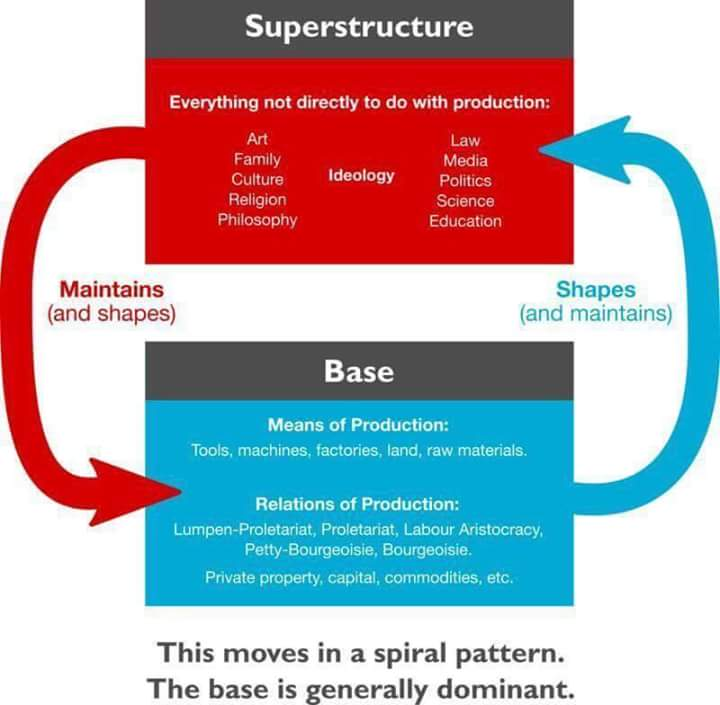Hi comrades, how do you go about applying Dialectical Materialism in your daily life? What tasks have you successfully solved using it?
I’m trying to get a deeper understanding of it right now by reading literature on it, right now I’m at Anti-Duhring (excerpts of it). I find it sometimes hard to apply what I’ve learned in personal cases, such as a discussion with someone, and so on.
a very brief summary of dialectical materialism in the broadest sense might be “all things change and all things are related”, which I’d assume most people understand to some extent and apply in mundane situations without thinking about it
e.g. by understanding the dialectical relationship between you (and your coworkers) and the capitalists you work for, you realize that you should do the bare minimum (unless there are other relationships to consider, e.g. if you’re a hospital worker)
well given the relationship between base and superstructure, it’s less something people apply daily to their lives, and more it is something that is applied daily, by society’s base, to society’s superstructure, and vice-versa, regardless of whether people are aware of it. I don’t think it necessarily makes sense for an individual apply it to daily life, but I welcome corrections if I’m wrong about that.

Yep, but the elements in the superstructure can have contradictions inherent in them, right? In any case, I heard of people applying it in their daily lives and so on, so I was curious
It’s a good question. I don’t have an answer. I would need to think about it for longer
All elements of both the base and the superstructure are riddled with inherent contradictions, and not just under capitalism (e.g. artistic vision vs market demand) but under socialism and communism as well (e.g. vision of one artist vs another’s). You cannot expect these things to be without contradictions, for the movement that results from the dynamic of contradictions is what keeps them going at all. Sometimes these contradictions are even desirable: You will gain stability and predictability by solving the contradictions, but in e.g. art and culture you need them to keep things interesting. Even things like mathematics, which are at first glance pure and free of any (logical) contradictions, have at their bottom statements that are true but not provable, as suggested by Gödel’s incompleteness theorem; and on a higher level there is also the ever-present (didactic) contradiction between mathematical truth and “common sense”.
To be vague, I use Dialectal Materialism daily in work in small ways. I know that certain days of work will be busier because of material conditions, whether that be a football game that is happening or heavy rainfall. That affects how busy I will be and I take it into consideration. I also take time with people when talking politics because I know that there is no Yes/No switch in people’s minds. I span Political conversations over time and sense the right time to bring it up. One conversation won’t change a liberal to a principled Marxist, and that’s because learning is a fundamental part of Marxism, critique and self-criticism along with research.
Thinking about things in terms of contradictions is useful. I use it daily when problem solving at my job, or just thinking about stuff I observe during my day. Helps prevent binary black/white thinking. For example, why are certain people acting this way? What contradictions are governing their life? Utilizing the base and superstructure model some1 else posted helps with this.
I have a desire for using my room to do things that are fun and-or productive (thesis), but I also have a desire to keep it clean (antithesis). Usually these two interests can coexist, but eventually I have spent so much time on other things than cleaning that there is a conflict (unity and conflict of opposites). As dust accumulates on the floor, a threshold is reached where I deem it ripe for cleaning (transition from quantitative to qualitative change). Once I start cleaning, the cleanliness of the room negates its utility (negation of the negation), but upon finishing, it is again both clean and useful (synthesis). However, the synthesis is characterised by different qualities than the original thesis, for instance that I can’t fucking remember where I put my stuff
I have found it really useful for helping resolve interpersonal conflict, such as with partners or friends or so on. Also I think it would be useful to help with internal conflicts as well. Dialectical behavioural therapy is a type of psychotherapy for example that is supposedly very effective for personality vulnerabilities, although this might not be materialist specifically. I’m not knowledgeable on the topic but it’s quite interesting.







